Come importare più file di testo da una cartella in un unico foglio di lavoro?
Ad esempio, hai una cartella con diversi file di testo e desideri importare questi file di testo in un singolo foglio di lavoro, come mostrato nello screenshot sottostante. Invece di copiare i file di testo uno per uno, ci sono trucchi per importare rapidamente i file di testo da una cartella in un unico foglio?
Importa più file di testo da una cartella in un unico foglio con VBA
Importa file di testo nella cella attiva con Kutools per Excel ![]()
Importa più file di testo da una cartella in un unico foglio con VBA
Ecco un codice VBA che può aiutarti a importare tutti i file di testo da una cartella specifica in un nuovo foglio.
1. Apri la cartella di lavoro in cui desideri importare i file di testo e premi i tasti Alt + F11 per abilitare la finestra Microsoft Visual Basic for Applications.
2. Clicca su Inserisci > Modulo, copia e incolla il seguente codice VBA nella finestra del Modulo.
VBA: Importa più file di testo da una cartella in un unico foglio
Sub Test()
'UpdatebyExtendoffice6/7/2016
Dim xWb As Workbook
Dim xToBook As Workbook
Dim xStrPath As String
Dim xFileDialog As FileDialog
Dim xFile As String
Dim xFiles As New Collection
Dim I As Long
Set xFileDialog = Application.FileDialog(msoFileDialogFolderPicker)
xFileDialog.AllowMultiSelect = False
xFileDialog.Title = "Select a folder [Kutools for Excel]"
If xFileDialog.Show = -1 Then
xStrPath = xFileDialog.SelectedItems(1)
End If
If xStrPath = "" Then Exit Sub
If Right(xStrPath, 1) <> "\" Then xStrPath = xStrPath & "\"
xFile = Dir(xStrPath & "*.txt")
If xFile = "" Then
MsgBox "No files found", vbInformation, "Kutools for Excel"
Exit Sub
End If
Do While xFile <> ""
xFiles.Add xFile, xFile
xFile = Dir()
Loop
Set xToBook = ThisWorkbook
If xFiles.Count > 0 Then
For I = 1 To xFiles.Count
Set xWb = Workbooks.Open(xStrPath & xFiles.Item(I))
xWb.Worksheets(1).Copy after:=xToBook.Sheets(xToBook.Sheets.Count)
On Error Resume Next
ActiveSheet.Name = xWb.Name
On Error GoTo 0
xWb.Close False
Next
End If
End Sub3. Premi F5 per visualizzare una finestra di dialogo e selezionare una cartella che contiene i file di testo che desideri importare. Vedi screenshot: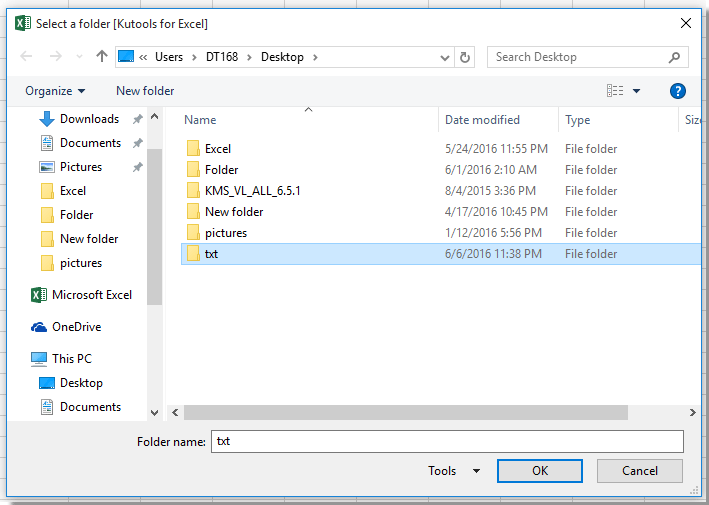
4. Clicca OK. Successivamente, i file di testo verranno importati nella cartella di lavoro attiva come nuovi fogli separati.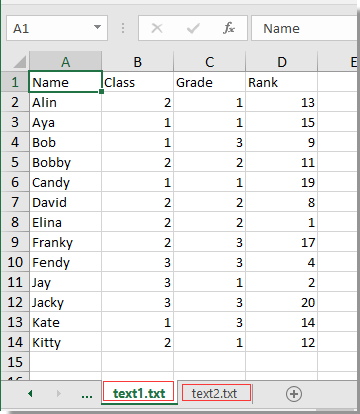
Importa file di testo nella cella attiva con Kutools per Excel
Se desideri importare un file di testo in una cella o intervallo specifico, puoi utilizzare l'utilità Inserisci file alla posizione del cursore di Kutools per Excel.
Dopo aver installato gratuitamente Kutools per Excel, procedi come segue:
1. Seleziona una cella in cui desideri importare il file di testo e clicca Kutools Plus > Importa/Esporta > Inserisci file alla posizione del cursore. Vedi screenshot: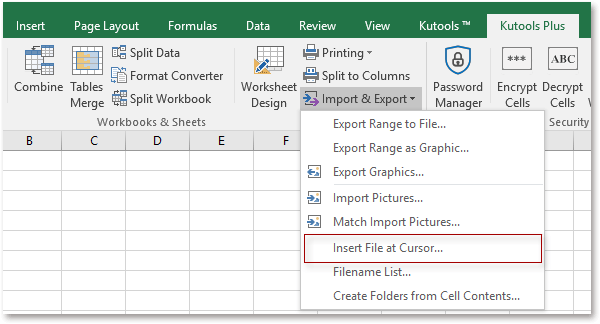
2. Si aprirà una finestra di dialogo, clicca Sfoglia per visualizzare la Seleziona un file da inserire nella posizione del cursore della cella, quindi seleziona File di testo dall'elenco a discesa e scegli il file di testo che desideri importare. Vedi screenshot: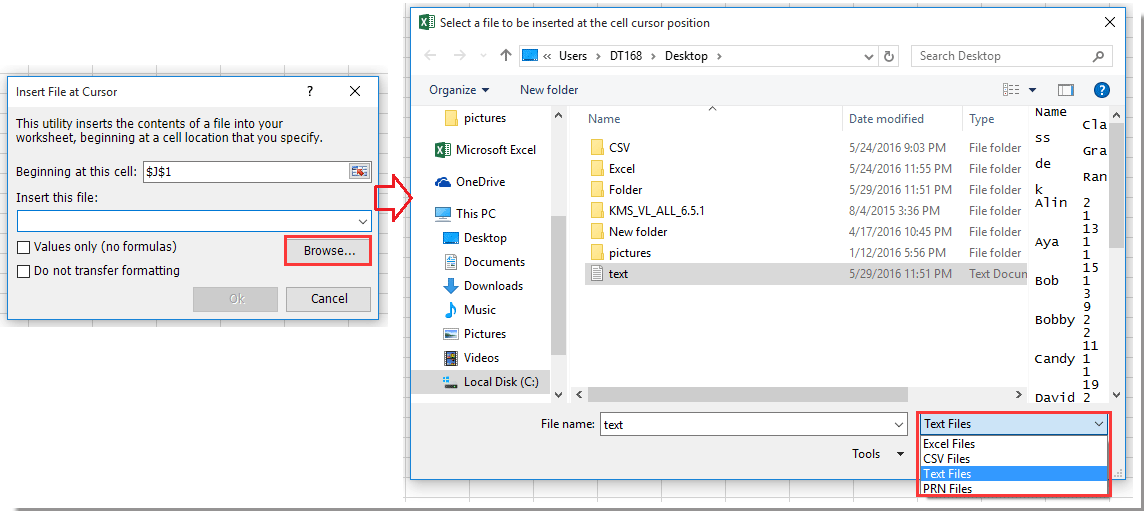
3. Clicca Apri > Ok, e il file di testo specifico sarà inserito nella posizione del cursore, vedi screenshot: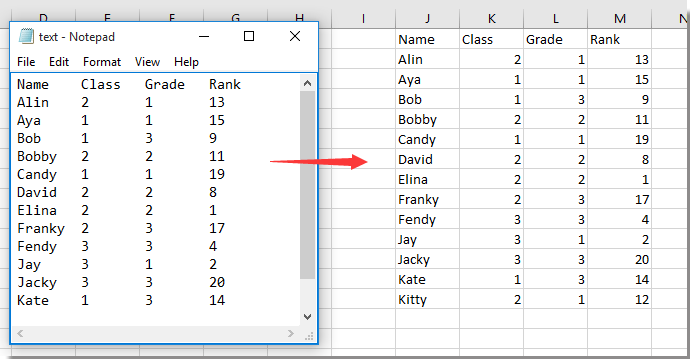
I migliori strumenti per la produttività in Office
Potenzia le tue competenze in Excel con Kutools per Excel e sperimenta un'efficienza mai vista prima. Kutools per Excel offre oltre300 funzionalità avanzate per aumentare la produttività e farti risparmiare tempo. Clicca qui per ottenere la funzione di cui hai più bisogno...
Office Tab porta le schede su Office e rende il tuo lavoro molto più semplice
- Abilita la modifica e lettura a schede in Word, Excel, PowerPoint, Publisher, Access, Visio e Project.
- Apri e crea più documenti in nuove schede della stessa finestra invece che in nuove finestre.
- Aumenta la produttività del50% e riduce centinaia di clic del mouse ogni giorno!
Tutti gli add-in Kutools. Un solo programma di installazione
La suite Kutools for Office include add-in per Excel, Word, Outlook & PowerPoint più Office Tab Pro, ideale per i team che lavorano su più app di Office.
- Suite tutto-in-uno — Add-in per Excel, Word, Outlook & PowerPoint + Office Tab Pro
- Un solo programma di installazione, una sola licenza — configurazione in pochi minuti (pronto per MSI)
- Funzionano meglio insieme — produttività ottimizzata su tutte le app Office
- Prova completa30 giorni — nessuna registrazione, nessuna carta di credito
- Massimo risparmio — costa meno rispetto all’acquisto singolo degli add-in